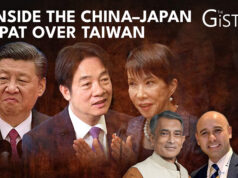It’s hard not to chuckle when Pakistan accuses anyone of waging a “proxy war.”
But here we are again. Field Marshal Asim Munir has stepped up to a podium, chest out, finger wagging, and declared that India is using Afghan soil to destabilise Pakistan.
Yes, Field Marshal. In a self-anointment worthy of banana republics and insecure juntas, Pakistan’s army chief Mullah Munir upgraded himself after the last limited skirmish with India, in which the two nuclear-armed neighbours launched tit-for-tat airstrikes.
That conflict, which began after a terror attack on Hindu pilgrims in Kashmir’s Pahalgam, saw Pakistan scrambling jets and issuing threats while quietly seeking backchannel de-escalation. And of course, claiming “victory” after terror camps and military airfields in Pakistan were levelled by Indian missile strikes. And thus justifying Munir’s upgrade.
Now, following a series of deadly ambushes by Baloch insurgents who killed over a dozen Pakistani soldiers, Munir is once again playing his greatest hit: Blame India. According to him, these attacks aren’t a homegrown rebellion against decades of repression, they’re part of a grand Indian conspiracy being run out of Afghanistan.
But here’s the truth: Pakistan is facing the consequences of its own actions. And it has been for a while now.
The Baloch insurgency isn’t some imported movement. It’s the product of decades of economic exploitation, political marginalisation, and military brutality. Entire villages have been razed. Thousands have “disappeared” without trial. Bodies turn up tortured. Activists are silenced or forced into exile. The military controls development and resource extraction while the local population lives in poverty. You don’t need RAW, Mossad or the CIA to incite rebellion in a place like that.
But Pakistan’s military elite has never been known for introspection. Instead, they excel at three things: Deny, Distract, and Deflect.
If the economy is tanking, blame India. If Baloch rebels hit back, blame India. If Afghan militants cross the border and attack Pakistani forces? Again, India. It’s the one-size-fits-all explanation for everything from failed state policies to poor governance and internal dissent.
And Munir is no stranger to inflammatory rhetoric. In early April, he delivered a now-infamous speech suggesting that “Hindus and Muslims cannot live together.” Barely a week later, Hindu tourists visiting Pahalgam in Kashmir were targeted in a brutal terror attack.
The result? India and Pakistan exchanged airstrikes in one of their most dangerous confrontations since Balakot. The subcontinent edged dangerously close to the brink—all because one man in uniform decided to make communal hate part of statecraft.
Now, instead of acknowledging that Pakistan’s internal crises are homegrown, Munir is recycling the same tired script. But this time, even seasoned watchers are rolling their eyes.
Pakistan is the original innovator of proxy warfare in South Asia. From the 1980s jihad in Afghanistan to the infiltration of Kashmir, from hosting Lashkar-e-Taiba and Jaish-e-Mohammed to sending thousands of fighters across borders, Islamabad’s doctrine of “strategic depth” has always involved outsourcing war to non-state actors while maintaining plausible deniability.
What Munir calls a “proxy war” by India is, in fact, the mirror image of Pakistan’s own policies now boomeranging back. It is karma in camouflage.
Let’s also spare a thought for Afghanistan, dragged yet again into Pakistan’s narrative as a staging ground for “Indian activities.” This, after Pakistan helped the Taliban return to power—imagining they’d be pliable clients once again. Instead, the Taliban have proven to be less obedient and more resentful of Pakistan’s meddling, refusing to control cross-border militants who now turn their guns westward.
What we are witnessing is a slow, grinding reckoning for a policy of exporting instability and importing denial. The Pakistani military has long believed it could play arsonist abroad and fireman at home. But when your own provinces are burning, and your own people are turning against you, you can’t keep blaming the neighbours.
Asim Munir and his brass-coated colleagues would do well to read the room. The world isn’t buying this narrative anymore. Even traditional allies are growing wary of Islamabad’s perennial victim complex. Internally, the country is reeling from economic freefall, civil unrest, and a legitimacy crisis. And yet, the generals carry on—as if invoking “India” can still hypnotise the masses into silence.
Sorry, Field Marshal, this isn’t a proxy war. It’s not foreign sabotage. It’s not RAW agents on the Durand Line. It’s the sound of a country reaping what it has long sown. A country whose establishment nurtured monsters and is now pretending to be shocked to find them at the gate.
And when the snakes you raised turn around and bite you, you don’t get to play the victim. You don’t get global sympathy.
You get a mirror. Look into it.
In a career spanning three decades and counting, Ramananda (Ram to his friends) has been the foreign editor of The Telegraph, Outlook Magazine and the New Indian Express. He helped set up rediff.com’s editorial operations in San Jose and New York, helmed sify.com, and was the founder editor of India.com.
His work has featured in national and international publications like the Al Jazeera Centre for Studies, Global Times and Ashahi Shimbun. But his one constant over all these years, he says, has been the attempt to understand rising India’s place in the world.
He can rustle up a mean salad, his oil-less pepper chicken is to die for, and all it takes is some beer and rhythm and blues to rock his soul.
Talk to him about foreign and strategic affairs, media, South Asia, China, and of course India.





